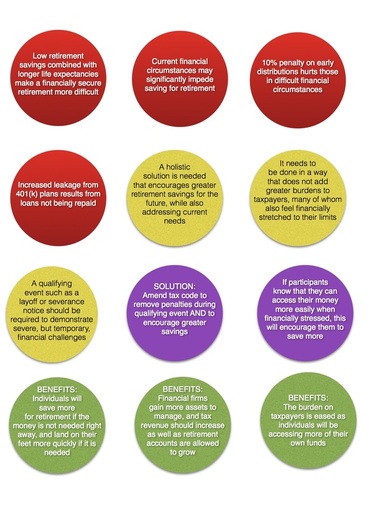 Holistic approach to retirement savings Holistic approach to retirement savings A recurring theme on these blog entries has been that one must consider saving for retirement as part of a holistic financial picture. Many people want to save for retirement but obstacles get in the way. The Tax Code outlines various provisions for distributions that are too early (pre-age 59 1/2), too late (post-age-70 1/2), too little (required minimum distributions), and too much. Undoubtedly, when these provisions were enacted, the intent was benevolent, to protect participants from using their 401(k) accounts frivolously as cash machines. The problem is that the penalty hurts those who are going through financial challenges at the worst possible time. In President Obama's most-recent budget proposal, he adds an exception to the 10% rule for those who are unemployed. (See page 176 of the document.) Under the President's proposal, individuals receiving unemployment compensation for more than 26 weeks would be allowed to withdraw up to $50,000 from their 401(k) or IRA without penalty. Distributions still would be taxed. As proposed, it would apply to distributions made after 2015. For those of us who have faced or are facing this challenge, the proposal might have minimal impact, but it is a good recognition of the problem and a step in the right direction. What I would like to see is the concept taken out a step or two further. There is a general consensus that retirement savings are way behind where they should be, particularly as life expectancies lengthen. I think the key is finding ways to not only make it easier to save more for retirement, but also to make access less restrictive when there is a demonstrated need. The solution has to be one that recognizes financial challenges can occur at any stage of life. If a participant knew that he or she could access funds during a financial emergency, then more funds would be contributed in the first place. Instead of taxing the early distribution and then penalizing it as well, devise ways for participants to get back on their feet, while reducing financial and emotional stress. By building up 401(k) accounts to higher levels, this will benefit participants in the long run. They will have saved much more if they never face financial challenges, and the support will be there if they do have these challenges. One other key is that by encouraging greater contributions, this will help build up emergency funds as well, without increasing the need for public assistance and without imposing on other taxpayers. That alone should make this concept appealing to both Democrats and Republicans, to both Liberals and Conservatives. It would help those with a great need get back on their feet, make it easier to contribute to the economy sooner, and reduce an already highly stressful situation.
0 Comments
Leave a Reply. |
Blog Author - Ken FelsherWith over 25 years of writing, editing, and research experience. I enjoy sharing with my readers my love of working with content on a variety of subjects. CategoriesAll 401(k) 402(g) Boomers Catch-up DB Dc Deferral Limit Defined Benefit Defined Contribution ERISA Healthcare Participation Pension Professionally Managed RCS Retirement Retirement Confidence Tax Code Vanguard Women Working Archives
March 2015
|
